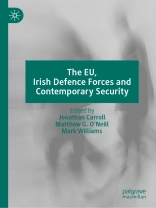This book aids any researcher, policymakers and military personnel in researching small states and militaries, European defence and security policy, as well as contemporary and emerging threats. This edited collection gathers academic commentators on Irish defence policy, military leaders from across the service components of the Irish Defence Forces and European defence experts to contribute to the first in-depth conversation and analysis on modern Irish defence and its application within the European Union. The aim of this edited book is to ascertain what capabilities are robust, which are lacking, what future threats need to be catered for, and what action is needed to ensure those threats will be addressed going forward. This book will explore emerging issues and applications of modern and contemporary threats within the context of Ireland, Europe and Western institutions. We have invited submissions from scholars, commentators, policymakers and military practitioners to evaluate the Irish Defence Forces and to illustrate the complexities facing small nations in formulating and resourcing defence and national security policy.
قائمة المحتويات
Introduction.- Theme One: Defence Forces Capabilities & The Threat Environment. Chapter 1. Ensuring the Jungle Doesn’t Grow Back: The Obligations Inherent to Irish Defence Policy.- Chapter 2. The GOC’s Perspective.- Chapter 3. A Critical Analysis of the Intellectual and Communications Culture of the Irish Defence Forces at a time of Emergent/Imminent Domestic and International Threats.- chapter 4. The Irish Naval Service: The Burden of the Minimalist Approach.- Chapter 5. Small Navies: Lessons for the Irish Naval Service.- Theme Two: The Reserve Defence Forces. Chapter 6.Revitalizing the Irish Army Reserve post-Commission on the Defence Forces: Moving from the Single Force Concept to a Total Force Policy.- Chapter 7. The Army Reserves – The Force-multiplier for Irish Defence.- Chapter 8. Ireland’s Naval Service Reserve – An Analysis of Current Capabilities and Role for the Future.- Theme Three: Peacekeeping Operations. Chapter 9. Decolonisation, Conflict, and Independence: The Impact of History on Ireland’s Approach to Peacekeeping.- Chapter 10. Ireland’s Largest Peacekeeping Mission – The Irish Defence Forces in UNIFIL.- Chapter 11. Peacekeeping in the Digital Age: Future Threats and Capability Requirements.- Theme Four: Cyber Security in the Digital Age. Chapter 12. Irish Cyber Security.- Chapter 13. Cyber resilience for Europe’s armed forces in the 21st Century – a German Perspective.- Chapter 14. The Irish Defence Forces in the Drone Age.- Theme Five: Defence Forces Institutional Innovation and Civil-Military Relations. Chapter 15. The Defence Forces Research Technology Initiative.- Chapter 16. Shared Norms but Policy Incoherence: Analysing the Irish Defence Forces’ Marketplace Aspirations.- Chapter 17. Representation, Negotiation, and Frustration. What path lies ahead for civil-military industrial relations.- Theme Six: The Principle of Irish Neutrality. Chapter 18. Ireland, NATO and the “Return of Geopolitics” in Europe.- Chapter 19. Irish Military Neutrality 1924-1945: A Historical Perspective for Modern Consideration.- Chapter 20. Generating More Heat Than Light? The Debate over Ireland’s Neutrality and the “European Army”.- Chapter 21. Conclusion.
عن المؤلف
Jonathan Carroll is a Ph D Candidate in Military History at Texas A&M University, USA.
Matthew G. O’Neill is a Leverhulme Interdisciplinary Network on Cybersecurity and Society (LINCS) postgraduate researcher in Political Science at the Senator George J. Mitchell Institute for Global Peace, Security and Justice at Queen’s University Belfast, UK.
Mark Williams is a Leverhulme Interdisciplinary Network on Cybersecurity and Society (LINCS) postgraduate researcher at the Senator George J. Mitchell Institute for Global Peace, Security and Justice at Queen’s University Belfast, UK.












